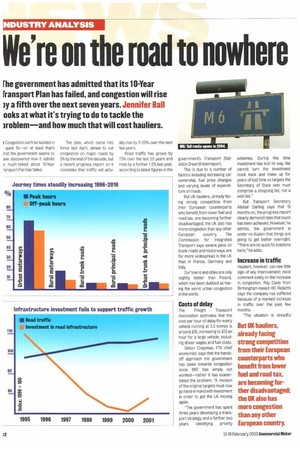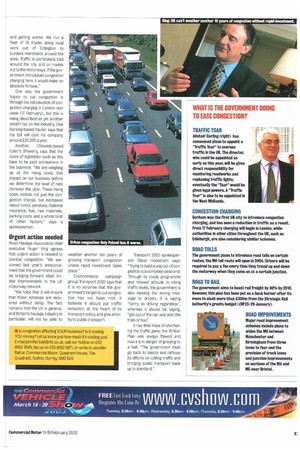We're on the road to nowhere
Page 12

Page 13

If you've noticed an error in this article please click here to report it so we can fix it.
Ile government has admitted that its 10-Year iransport Plan has failed, and congestion will rise iy a fifth over the next seven years. Jennifer Ball ooks at what it's trying to do to tackle the irohlem and how much that will cost hauliers.
I Congestion can't be tackled in quick fix—or at least that's That the government seems to ave discovered now it admits s much-talked about 10-Year ransport Plan has failed. The plan, which came into force last April, aimed to cut congestion on major roads by 5% by the end of the decade, but a recent progress report on it concedes that traffic will actu
ally rise by 11-20% over the next few years.
Road traffic has grown by 73% over the last 20 years and rose by a further 1-2% last year, according to latest figures in the government's Transport Statistics Great Britain report.
This is due to a number of factors including increasing car ownership, fuel price changes and varying levels of expenditure on roads.
But UK hauliers, already facing strong competition from their European counterparts who benefit from lower fuel and road tax, are becoming further disadvantaged; the UK also has more congestion than any other European country The Commission for Integrated Transport says severe jams on trunk roads and motorways are far more widespread in the UK than in France, Germany and Italy.
Our towns and cities are only slightly better than Poland, which has been dubbed as having the worst urban congestion in the world.
Costs of delay
The Freight Transport Association estimates that the cost per hour of delay for every vehicle running at 3.5 tonnes is around £10, increasing to £13 an hour for a large vehicle, including driver wages and fuel costs.
Simon Chapman, FA chief economist, says that the handsoff approach the government has taken towards congestion since 1997 has simply not worked—rather it has exacerbated the problem: "A revision of the original targets must now go hand-in-hand with investment in order to get the UK moving again.
"The government has spent three years developing a transport strategy and a further two years identifying priority schemes. During this time investment has lost its way. We cannot turn the investment clock back and make up for years of lost time so targets the Secretary of State sets must comprise a shopping list, not a wish list."
But Transport Secretary Alistair Darling says that 18 months on, the progress report clearly demonstrates that much has been achieved. However, he admits, the government is under no illusion that things are going to get better overnight: "There are no quick fix solutions here," he adds.
Increase in traffic
Hauliers, however, can see little sign of any improvement; most comment solely on the increase in congestion. Ray Davis from Birmingham-based HD Ricketts says the company has suffered because of a marked increase in traffic over the past few months.
"The situation is dreadful and getting worse. We run a fleet of 13 trucks doing local work out of Erdington to builders merchants around the area. Traffic is particularly bad around the city and on routes out to the motorways, If the government introduced congestion charging here it would make an absolute fortune."
One way the government hopes to cut congestion is through the introduction of congestion charging in London next week (IT February), but this is being described as yet another stealth tax on the industry. One Barking-based haulier says that the toll will cost his company around £30,000 a year.
Another, Chiswick-based Fuller's Brewery, says that the costs of legislation such as this have to be paid somewhere in the business. 'We are weighing up all the rising costs that impact on our business before we determine the level of rate increase this year. These rising costs include not just the congestion charge, but increased labour costs, pensions, National Insurance, fuel, raw materials, parking costs and a whole host of other factors," says a spokesperson.
Urgent action needed
Road Haulage Association chief executive Roger King agrees that urgent action is needed to combat congestion: 'We welcomed last year's announcement that the government could be bringing forward albeit limited improvements to the UK motorway network.
"We hope that it will ensure that these schemes are delivered without delay. The fact remains that the UK in general, and Britain's haulage industry in particular, will not be able to weather another ten years of growing transport congestion unless rapid investment takes place."
Environmental campaign group Transport 2000 says that it is no surprise that the government's target to cut congestion has not been met. It believes it should put traffic reduction at the heart of its transport policy and give priority to public transport. Transport 2000 spokesperson Steve Hounsham says: "Trying to build a way out of congestion is a complete dead end. Through its roads programme and relaxed attitude to rising traffic levels, the government is also sending the wrong message to drivers. It is saying "carry on driving regardless", whereas it should be saying, "get out of the car and onto the train or bus".
It has little hope of shortening the traffic jams: the 10-Year Plan was always flawed and now it is in danger of grinding to a halt. "The government must go back to basics and refocus its efforts on cutting traffic and bringing public transport back up to standard."




































































































































































